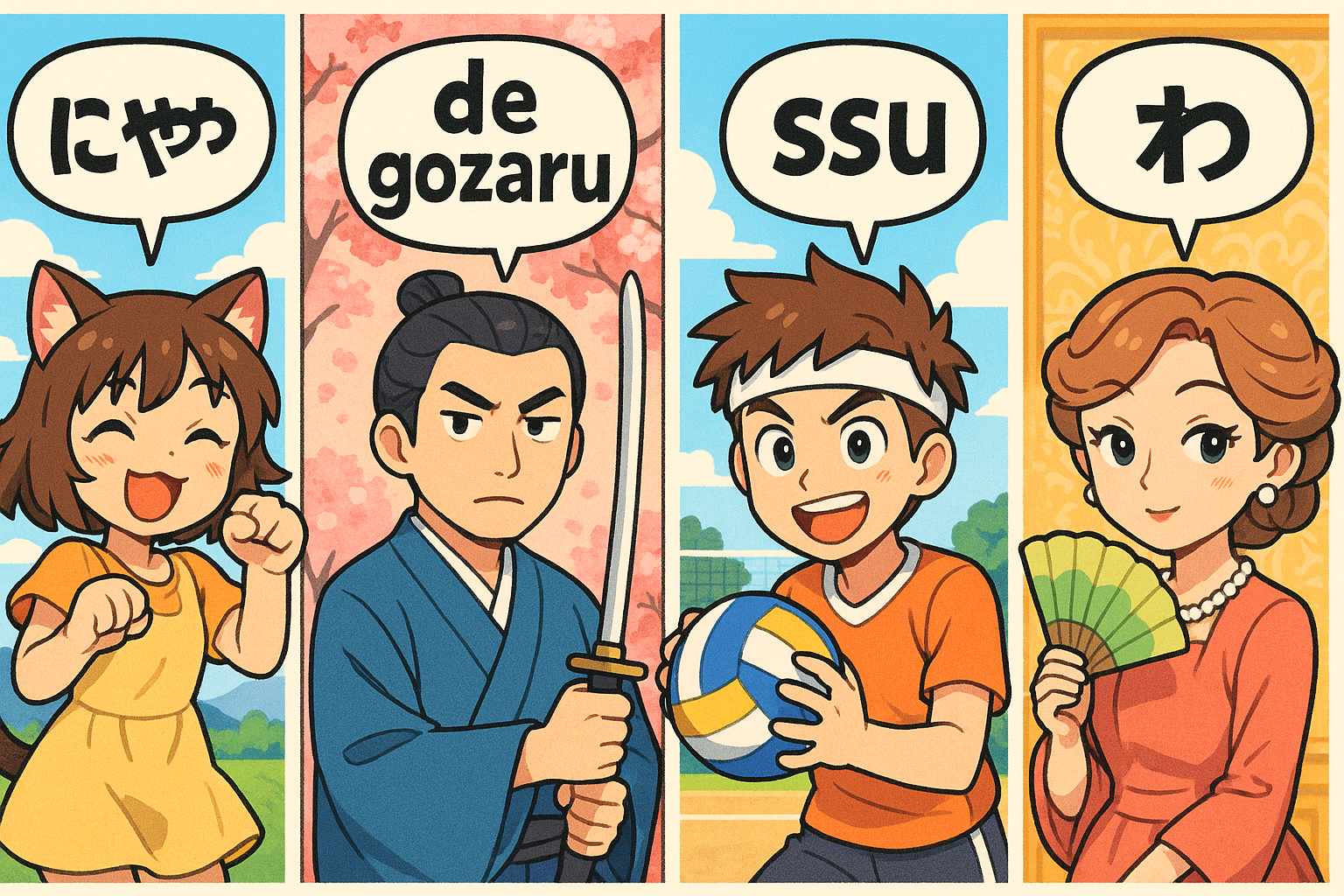
Introduction
If you’ve watched anime, you’ve probably heard characters ending their sentences with weird and cute sounds like “-nya”, “-de gozaru”, or “-ssu”. But what do these actually mean? Are they real Japanese, or just anime magic? Let’s explore the fun world of anime sentence endings!
アニメでよく聞く語尾「にゃ」「でござる」「っす」…これって本物の日本語?それともキャラ作りのため?
What Are Sentence Endings in Anime?
In real Japanese, people sometimes use sentence endings to show politeness, gender, or emotion. In anime, these endings get super exaggerated to make characters more memorable and unique!
These endings are called “gobi” (語尾, sentence endings). Anime uses them for:
- Emphasizing personality
- Making characters stand out
- Adding cuteness or comic effect
Popular Anime Sentence Endings & Famous Characters
-
“-nya” / 「にゃ」
Cat-like characters use this to sound cute and “neko-ish.”
Famous examples:- Happy (Fairy Tail): “Nya!”
- Nyanko-sensei (Natsume’s Book of Friends)
- Ichigo Momomiya (Tokyo Mew Mew): “It’s Mew Mew Strawberry, nya!”
-
“-de gozaru” / 「でござる」
Old samurai or ninja style. Sounds very formal and “historical.”
Famous examples:- Kenshin Himura (Rurouni Kenshin): “Ore wa rurouni de gozaru.”
- Donatello (Japanese dub of Teenage Mutant Ninja Turtles)
-
“-ssu” / 「っす」
Youth slang, “bro” or sporty vibe. Laid-back and friendly, often used by junior or underclassmen-type characters.
Famous examples:- Hinata Shoyo (Haikyuu!!): “Hai, ok, sugu行くっす!”
- Yamaguchi (Haikyuu!!)
-
“-nano” / 「なの」
Used by cute, childlike, or robotic girls. Soft and innocent.
Famous examples:- Takara Miyuki (Lucky Star)
- Hakase (Nichijou): “Sore wa uso nano!”
-
“-wa” / 「わ」
Gives a feminine, soft impression. Often used by “ojou-sama” (rich girls) or elegant women.
Famous examples:- Misa Amane (Death Note)
- Shizuka Minamoto (Doraemon)
Why Do They Use These Endings?
- To make the character instantly recognizable
- To show a unique personality or background (cat, samurai, sporty, robot…)
- For humor or cuteness
- Sometimes to reference a historical or fantasy world
Real Japanese people almost never use these endings in daily life—so don’t copy them at school or work!
Sample Dialogue
Ichigo (Tokyo Mew Mew): “Let’s save the world, nya!”
Kenshin (Rurouni Kenshin): “Shinpai irazu de gozaru.”
Hinata (Haikyuu!!): “Zenryoku de yaruっす!”
Hakase (Nichijou): “Kore, sugoi nano!”
Rich girl: “Ohoho, sore wa omoshiroi wa!”
Fun Facts
- Some endings come from regional dialects, like “-ya de” from Kansai-ben.
- “-Nya” is not just for cats! Sometimes used for magical girls or aliens, too.
- Japanese fans sometimes imitate these endings at anime events for fun!
Conclusion
Anime sentence endings are one of the things that make Japanese pop culture so much fun. Next time you watch your favorite anime, listen for those “-nya,” “-de gozaru,” or “-ssu” endings—and try to guess what kind of character is talking!
アニメの語尾でキャラの性格や世界観がわかると、もっと日本語とアニメが楽しくなりますよ!